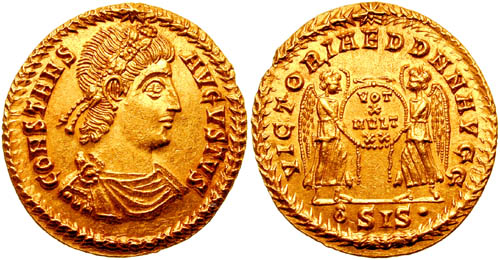Constans was born in 323 AD, the third and youngest son of Constantine I and his second wife, Fausta. He was educated at his father's court in Constantinople and in 333 AD, at ten years old, was elevated to Caesar.
Constantine I died in 337 AD, leaving Constans and his two elder brothers, Constantine II and Constantius II, as co-emperors and their cousins, Dalmatius and Hannibalius, as Caesars. This arrangement, made two years earlier, barely lasted a month as the three brothers swiftly arranged the murders of Dalmatius and Hannibalius as well as virtually all other relatives who could have had a claim to the throne.
 |
| Roman coins engraved with Constans' name and image |
Constans' share of the Roman world was Italia and the African provinces, a small portion when compared to the territories of his two elder brothers. A meeting of the three brothers in Viminacium (modern-day Serbia) in 338 AD granted Constans the additional territories of Illyricum and Thrace. This increase of Constans' power hugely annoyed his eldest brother, Constantine II, who ruled the western provinces.
In an attempt to maintain the fragile peace, Constans handed the African provinces to Constantine II but he became ever more reluctant to accept his eldest brother's seniority. Tensions between the brothers heightened when Constantine II refused to hand over the guardianship of his younger brother's territories when Constans came of age. Things came to a head when, in 340 AD, Constantine II invaded Italy. Constans, busy suppressing a rebellion in Dacia, desperately dispatched a small unit of Illyrian troops who, against all odds, managed to ambush and kill Constantine II near the town of Aquileia in northern Italy. Constans seized control over his brother's former provinces of Gaul, Britain and Hispania and became joint-emperor with Constantius II.
Constans had an energetic start to his reign. In 341 AD he lead a successful campaign against the Franks and in 343 AD made a short and unusual visit to Britain. The reason for Constans' trip to one of his remotest provinces is unrecorded but it was followed by widespread re-fortification of towns and the appearance of Germanic mercenaries in East Anglia and along the southeastern coast. His relationship with Constantius was strained at best. Like their father, both brothers became entangled in the squabbles of the various sects of the early Christian Church and their religious differences almost led to open warfare. However, in 346 AD, the co-emperors simply agreed to disagree.
In the final years of his reign, Constans gained an unsavory reputation for cruelty, misrule and 'scandalous behaviour with handsome barbarian hostages'. Crucially, he became unpopular with the army and in 350 AD a Roman general by the name of Magnentius declared himself emperor at Augustodunum (modern-day Autun, France) with the support of the Roman troops in the western provinces. With no support beyond his immediate household, Constans was forced to flee for his life. However, he was swiftly cornered by Magnentius's men in the Pyrenees and killed while seeking sanctuary in a temple in Vicus Helena (modern-day Elne, France).
Magnentius' rebellion lasted less than a year. Constantius II defeated the usurper twice in battle and reclaimed his brother's territories, ruling as sole emperor until elevating his cousin, Constantius Gallus, to Caesar in 351 AD.
No comments:
Post a Comment